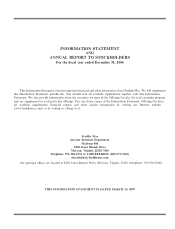Freddie Mac 2006 Annual Report Download - page 21
Download and view the complete annual report
Please find page 21 of the 2006 Freddie Mac annual report below. You can navigate through the pages in the report by either clicking on the pages listed below, or by using the keyword search tool below to find specific information within the annual report.If we were classiÑed as less than adequately capitalized, our ability to pay dividends on common or preferred stock could
be restricted. Also, if a dividend payment on our common or preferred stock would cause us to fail to meet our minimum
capital or risk-based capital requirements, we would not be able to make the payment without prior written approval from
OFHEO. For additional information about our regulatory capital requirements, see ""NOTE 10: REGULATORY
CAPITAL'' to our consolidated Ñnancial statements.
In a letter dated January 28, 2004, OFHEO created a framework for monitoring our capital due to our higher
operational risk, including our inability to produce timely Ñnancial statements in conformity with GAAP. The letter directed
that we maintain a mandatory target capital surplus of 30 percent over our minimum capital requirement, subject to certain
conditions and variations; that we submit weekly reports concerning our capital levels; and that we obtain prior approval of
certain capital transactions including common stock repurchases, redemption of any preferred stock or payment of dividends
on preferred stock above stated contractual rates. For additional information about the OFHEO mandatory target capital
surplus framework, see ""NOTE 10: REGULATORY CAPITAL'' to our consolidated Ñnancial statements. Also, see
""RISK FACTORS Ì Legal and Regulatory Risks Ì Developments aÅecting our legislative and regulatory environment
could materially harm our business prospects or competitive position'' for more information.
Department of the Treasury
Under our charter, the Secretary of the Treasury has approval authority over our issuances of notes, debentures and
substantially identical types of unsecured debt obligations (including the interest rates and maturities of these securities), as
well as new types of mortgage-related securities issued subsequent to the enactment of the Financial Institutions Reform,
Recovery and Enforcement Act of 1989. The Secretary of the Treasury has performed this debt securities approval function
by coordinating GSE debt oÅerings with Treasury funding activities. The Treasury Department is reviewing its process for
approving our debt oÅerings.
Securities and Exchange Commission
While we are exempt from Securities Act and Exchange Act registration and reporting requirements, we are dedicated
to fulÑlling our commitment to register our common stock under the Exchange Act. We plan to begin the process of
registering our common stock with the SEC after resuming timely quarterly Ñnancial reporting. Once this process is
complete, we will be subject to the Ñnancial reporting requirements applicable to registrants under the Exchange Act,
including the requirement to Ñle with the SEC annual reports on Form 10-K, quarterly reports on Form 10-Q and current
reports on Form 8-K. In addition, OFHEO issued a supplemental disclosure regulation that will obligate us to submit proxy
statements and insider transaction reports to the SEC in accordance with rules promulgated under the Exchange Act. After
our common stock is registered under the Exchange Act, our securities will continue to be exempt from the securities
oÅering registration requirements of the Securities Act and certain other provisions of the federal securities laws.
GSE Regulatory Oversight Legislation
We face a highly uncertain regulatory environment in light of GSE regulatory oversight legislation currently under
consideration in Congress. During 2005, the House of Representatives and the Senate Committee on Banking, Housing, and
Urban AÅairs each passed a bill that would have resulted in signiÑcant changes in the existing GSE regulatory oversight
structure. Congressional consideration of those bills ended with the expiration of the 109th Congress in December 2006.
A new session of Congress began in January 2007. Legislation has been introduced in the House of Representatives,
containing provisions that would substantially alter the current regulatory framework under our charter and the GSE Act.
The bill that was introduced includes provisions that would:
‚ give our regulator substantial authority to regulate the amount and composition of our portfolio investments and to
require substantial reductions in those investments;
‚ increase the regulator's authority to require us to maintain higher minimum and risk-based capital levels and to
approve new products;
‚ modify our aÅordable housing goals; and
‚ for 2007 through 2011, require us to make an annual contribution to an aÅordable housing fund in an amount equal to
1.2 basis points of our average total mortgage portfolio.
While new GSE oversight legislation has yet to be introduced in the Senate, we believe the Senate is likely to consider
legislation that poses similar issues, but may also include provisions that diÅer materially from any bill considered in the
House. Provisions of the bill introduced in the House or any other bill considered by the House or Senate, individually and
in certain combinations, could have a material adverse eÅect on our ability to fulÑll our mission, future earnings, stock price
and stockholder returns, the rate of growth in our fair value and our ability to recruit qualiÑed oÇcers and directors.
We believe appropriate GSE regulatory oversight legislation would strengthen market conÑdence and promote our
mission. We cannot predict the prospects for the enactment, timing or content of any Ñnal legislation.
9Freddie Mac
























